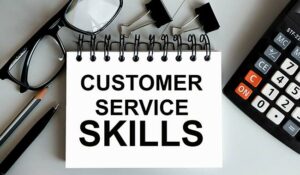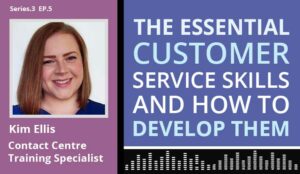This blog summarizes the key points from a recent article from David McGeough at Scorebuddy where he explored how to cultivate the essential hard skills for outstanding customer service.
When discussing customer support, we often prioritize soft skills, but hard skills are equally crucial. While it’s natural to focus on how agents interact, the core of exceptional customer service lies in their technical abilities.
With the rapid evolution of technology – including tools like GenAI, VoIP, and CRMs – developing these technical competencies is becoming increasingly complex. Coupled with rising interaction volumes and customer expectations, it’s clear that a blend of technical expertise and interpersonal skills is essential.
Regardless of the challenges, delivering top-notch customer service is vital, as 88% of consumers demand quick, consistent, and tailored interactions. This expectation can mean the difference between retaining customers and losing them to competitors.
Are your agents properly equipped with the necessary skills?
Understanding Customer Service Hard Skills
Customer service hard skills encompass the technical abilities required by agents to assist customers effectively.
These skills include familiarity with software, proficiency in navigating call centre systems, and overall digital literacy, among other competencies.
Unlike soft skills – such as communication, active listening, and empathy – hard skills are more centered on the technical execution of customer support tasks.
Mastery of these skills is vital for agents to deliver efficient service, remain productive, and showcase their soft skills effectively.
Key Hard Skills for Customer Service
Product and Industry Knowledge
Agents need a thorough understanding of the company’s offerings and the industry landscape. This knowledge includes familiarity with features, pricing, benefits, and common customer issues.
A well-informed agent can provide precise solutions quickly, leading to higher customer satisfaction and faster response times. To bolster this knowledge, provide regular training sessions and comprehensive product demos.
Omnichannel and CRM Proficiency
Managing customer interactions across various channels is essential for today’s consumers, with 71% preferring to switch channels based on context.
Familiarity with CRM tools is critical, as they provide access to unified customer data and communication histories. Investing in training for these systems will enable agents to create seamless, personalized experiences, enhancing customer loyalty.
Digital Literacy and ICT Skills
Agents should be well-versed in the use of computers and various digital tools that facilitate customer service. High digital literacy ensures they can adapt to new technologies quickly, improving efficiency and response times. Regular software training and workshops can help agents enhance their capabilities.
Language Proficiency
Effective communication in the languages spoken by customers is crucial. This doesn’t just involve soft skills like conversation; it’s about clear, fluent language use.
Multilingual agents can serve a wider audience, promoting global growth. Encourage language courses or mentorship programs to help agents develop these skills.
Writing Skills
Agents must communicate clearly and professionally in written form, particularly in text-based support scenarios.
Messages should be structured and informative, as poor writing can lead to misunderstandings. Organizing writing workshops and providing templates for common scenarios can enhance clarity and efficiency.
Data Entry and Analysis
Accurate data management is crucial in customer service. This includes entering customer information and analyzing interaction data to identify trends.
Proper data handling facilitates faster future interactions and informed decision-making. Training on data entry accuracy and using analysis tools can significantly improve service quality.
Technical Know-How
Understanding the technical aspects of your company’s products is essential for troubleshooting and issue resolution.
Agents with solid technical knowledge can address problems swiftly, leading to improved first-contact resolution rates and higher customer satisfaction. Offer training programs focused on product familiarity and hands-on experience.
Familiarity With AI Tools
As AI technology becomes more prevalent in customer service, knowing how to leverage these tools is essential. AI can handle routine queries, allowing agents to focus on complex issues. Providing tutorials on AI tools and maintaining a detailed knowledge base can help agents utilize these resources effectively.
Strategies to Enhance Customer Service Hard Skills
Targeted Training and Coaching
Implement hands-on targeted training focusing on specific tools, complemented by real-time coaching for skill refinement.
Comprehensive Knowledge Bases
Develop and maintain an extensive knowledge base for agents to quickly access information and enhance their expertise.
Role-Playing Scenarios
Facilitate practice sessions where agents reenact real customer interactions to apply their hard skills in practical situations.
Interactive Workshops
Organize workshops to delve into complex tools, systems, or industry specifics, enhancing agents’ understanding of their roles.
Peer Learning and Reviews
Foster a collaborative environment where agents can share knowledge and tips with one another to create a positive learning environment.
Mentorship Programs
Pair experienced agents with newcomers to provide guidance and support, promoting skill development.
Access to Online Courses
Offer industry-relevant courses and certifications to enable agents to acquire new skills or deepen their existing knowledge.
Tutorials and Guides
Supply step-by-step resources for agents to consult when refreshing their knowledge on various topics.
Regular Performance Reviews
Conduct consistent assessments of performance as part of your quality assurance and overall development processes.
Assessing Customer Service Hard Skills in a Call Centre
- Hiring and Interviews: Use role-specific questions and technical assessments during the hiring process to evaluate candidates’ skills.
- Quality Assurance: Monitor calls and conduct QA reviews to assess agents’ application of hard skills in real interactions.
- Skills Assessments: Implement tests and quizzes to evaluate proficiency in essential hard skills.
- Self-Assessment and Peer Feedback: Encourage agents to reflect on their own performance and participate in peer evaluations for improvement insights.
- Customer Feedback: Analyze customer satisfaction surveys to gauge perceptions of agents’ skill application.
- Simulations and Role-Playing: Regularly engage agents in role-playing exercises that mimic real scenarios, allowing them to practice their hard skills in a supportive setting.
Utilizing QA to Enhance Customer Service Hard Skills
As industries evolve, so too will the expectations for customer service hard skills. Implementing QA software enables you to monitor and assess agent performance comprehensively. You can develop specific scorecards to evaluate skills, identify areas needing improvement, and create targeted plans for enhancement.
This adjusted content presents the same ideas but with varied phrasing and structure, reducing the risk of duplication while still conveying the importance of hard skills in customer service.
This blog post has been re-published by kind permission of Scorebuddy – View the Original Article
For more information about Scorebuddy - visit the Scorebuddy Website
Call Centre Helper is not responsible for the content of these guest blog posts. The opinions expressed in this article are those of the author, and do not necessarily reflect those of Call Centre Helper.
Author: Scorebuddy
Reviewed by: Jo Robinson
Published On: 28th Oct 2024
Read more about - Guest Blogs, David McGeough, Scorebuddy






 Scorebuddy is quality assurance solution for scoring customer service calls, emails and web chat. It is a dedicated, stand-alone staff scoring system based in the cloud, requiring no integration.
Scorebuddy is quality assurance solution for scoring customer service calls, emails and web chat. It is a dedicated, stand-alone staff scoring system based in the cloud, requiring no integration. 









